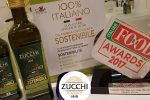5 July 2016
Extra virgin olive oil is a fundamental part of the Mediterranean diet: its culinary and nutritional properties are the seal of its nutraceutical value.
Let us examine this valuable foodstuff together.
- Extra virgin olive oil is produced from olives by means of strictly mechanical processes.
- The conditions in which the olives are processed to produce an ‘extra virgin’ product must be maintained constant to ensure that the ‘free acidity in the form of oleic acid does not exceed 0.8%’.
- The taste of an extra virgin olive oil has to be as close as possible to the essence of the olive from which it was made because it really is a ‘pressed’ product. A slightly bitter and hot taste it is one of its positive properties.
- A good quality extra virgin olive must leave at least a bitter, almost hot, note in the mouth after it is tasted.
- Green gold, we could call it. It mostly consists of lipids, which are rich in fatty acids, in particular monounsaturatedoleic acidthat makes it a suitable foodstuff for frying and for preserving products in oil as well as being a true purveyor of health.
- It also contains vitamins and betacarotene that have an antioxidant effecton the entire organism that benefit tissues and cells, and in particular protect their health and slow down aging.
- From the nutritional point of view, the properties ofextra virgin olive oilare the main reasons why it is consumed. It mainly consists of monounsaturated vegetable fats, which are healthier and easier to process and have positive effects on the entire cardiocirculatory system.






